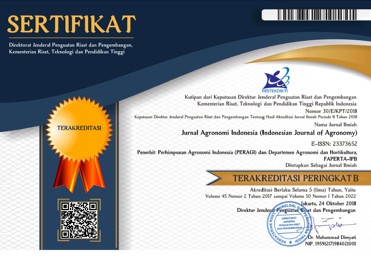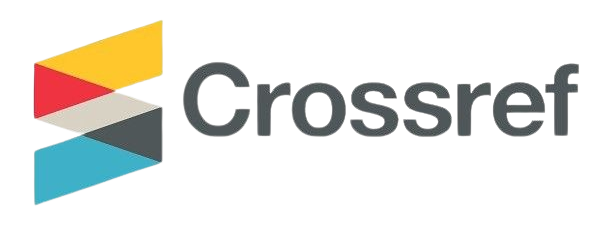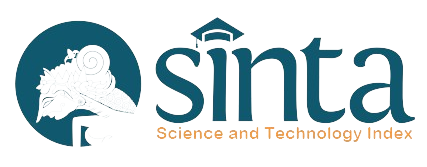Peningkatan Toleransi Kedelai Sindoro terhadap Kekeringan Melalui Seleksi In Vitro
Abstract
In vitro selection of embryogenic cell mass is one alternative to improve drought tolerance in plants. Embryogenic cell callus of soybean were radiated by Gamma ray (400 rad) to produce mutation. The radiated cell were tested with PEG (0, 10, 20 and 30 %) for drought stress tolerance. After selection, cells which tolerant to PEG were regenerated to produce somatic embryo structure, somatic seed and plantlet. Acclimatization was done in a greenhouse and analysis of proline was done at generation 1 (G1). The purpose of the experiment was to get soybean somatic seed which tolerant to drought stress. Results of experiment showed that 39.7 % embriogenic callus were produced. The higher the concentration of PEG, the higher the death of cell/callus. The rate of producing somatic embryo structure was 4.9 at 0 % PEG; 2.85 at 10 % PEG; 1.6 at 20% PEG and 0.6 at 30% PEG. Number of somatic seed which developed in regeneration medium (S11) were 79 from 0% PEG; 35 from 10% PEG; 29 from 20% PEG, and 15 from 30% PEG. Somatic seed produced 15 planlets from PEG 0%; 6 planlets from PEG10%; 4 planlets from PEG 20%. Based of proline content, all of G1somaclones were more tolerant than the mother plant.
Key words : Soybean, in vitro selection, PEG, regeneration, acclimatization and dry land.
How to Cite
HusniA., KosmiatinM., & MariskaI. (1). Peningkatan Toleransi Kedelai Sindoro terhadap Kekeringan Melalui Seleksi In Vitro. Jurnal Agronomi Indonesia (Indonesian Journal of Agronomy), 34(1). https://doi.org/10.24831/jai.v34i1.1271
Section
Articles












